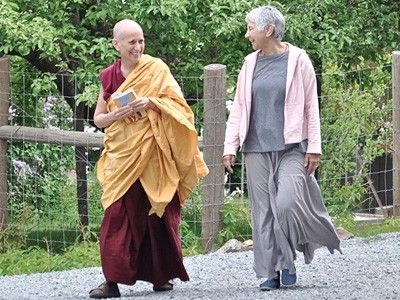A community based on shared values
Part of a series of talks given during the annual Young Adult Week program at Sravasti Abbey in 2006.
About Sravasti Abbey
- Introducing Sravasti Abbey
- History and development of the Abbey
Young adults 01: Community (download)
Dharma values: part one
- Living key Dharma values and principles
- The mutual relationship between the sangha and lay people
Young adults 01: Values (download)
Questions and answers
- Kindness
- Pride
Young adults 01: Q&A (download)
Excerpt: Cultivating a long-term motivation
We always create a long-term motivation because that long-term motivation creates an incredible sense of space in our mind.
Usually our minds are so limited and we’re thinking, “How can I get my own pleasure as soon as possible?” That state of mind creates many difficulties. The mind is so narrow and focused on “me, what I want, my problems, what I like and don’t like,” that the mind is not in a very happy state and it’s not in a state that is really of great benefit to anybody, including ourselves.
That’s why we create this long-term motivation, remembering our long-term spiritual goal of full enlightenment for the benefit of sentient beings. Even if that’s going to take a few countless great eons, it’s okay, because it’s something very valuable and wonderful to do. When we place what we’re doing now within this bigger context, it gives a whole new feeling to the actions we’re doing now.
Placing what we’re doing now within the context of, “How can I feel good today?” is what makes us so stuck so often. But when we place what we’re doing now within this huge context of being of benefit to all the numberless, limitless, uncountable sentient beings, then there’s a sense of space in our mind for what we’re doing, and that enables us to continue doing something beneficial over a long period of time.
That’s why we always start with cultivating our motivation. It’s very important to do that.
Excerpt: Eating only food that is offered to the Abbey
You make yourself dependent so that you are constantly aware of the kindness of others just in keeping your body alive. Also, when you receive food that’s offered, it really helps counteract your attachment to food, because you can’t go to the store to get what you want to eat.
Venerable Thubten Chodron
Venerable Chodron emphasizes the practical application of Buddha’s teachings in our daily lives and is especially skilled at explaining them in ways easily understood and practiced by Westerners. She is well known for her warm, humorous, and lucid teachings. She was ordained as a Buddhist nun in 1977 by Kyabje Ling Rinpoche in Dharamsala, India, and in 1986 she received bhikshuni (full) ordination in Taiwan. Read her full bio.


